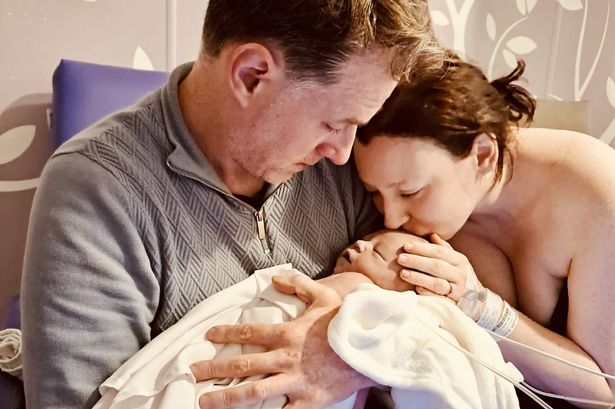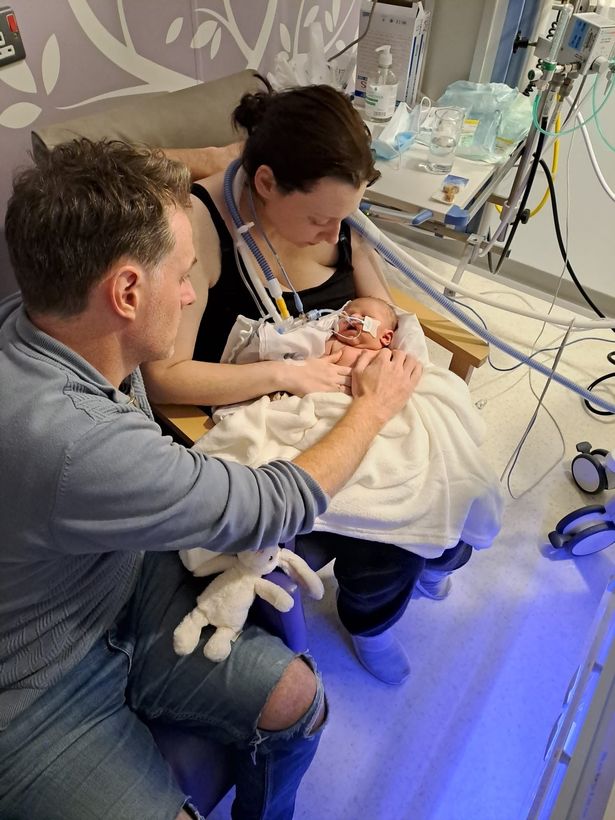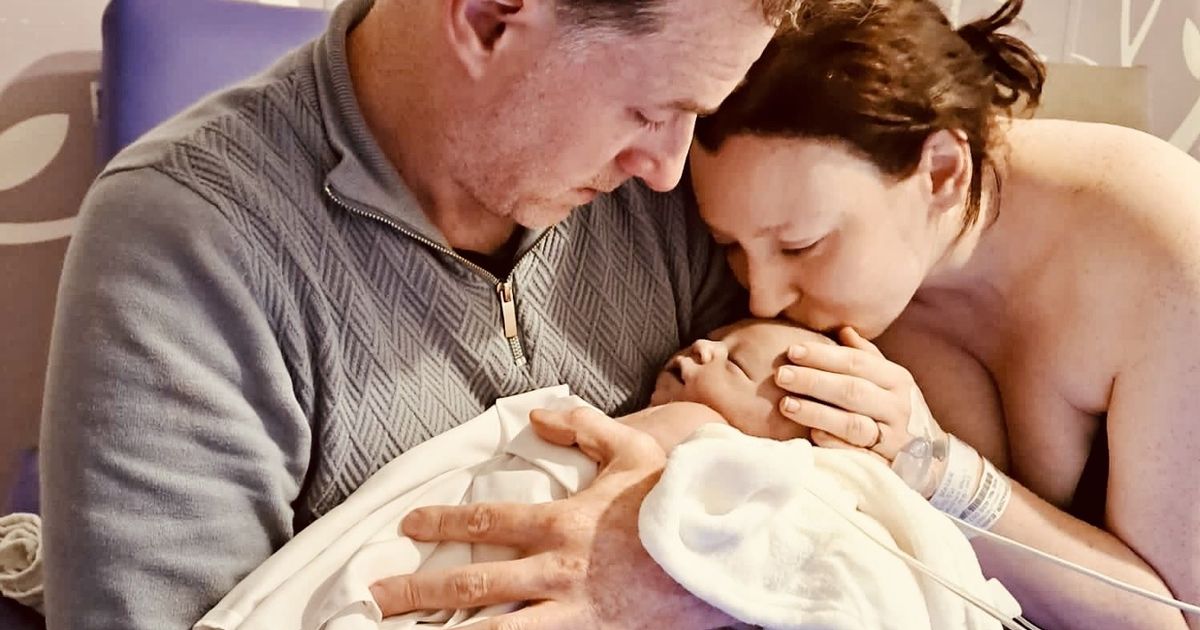An inquest into the death of Liliwen Iris Thomas heard her mother was left alone for an hour. She managed to cry for help and it was discovered that her baby daughter had already been born Emily Brazier, Rhodri Thomas and their baby daughter Liliwen who died hours after being born (Image: Slater and Gordon)
Emily Brazier, Rhodri Thomas and their baby daughter Liliwen who died hours after being born (Image: Slater and Gordon)
A newborn baby died after her mother was left alone to give birth in Wales’ biggest hospital without supervision from a midwife or any medical professional, an inquest has heard.
Liliwen Iris Thomas was born at the University of Wales Hospital but died just hours later after her mother, Emily Brazier, was left unattended in labour.
An inquest into the death of Liliwen was held at Pontypridd Coroner’s Court on Tuesday, July 8. The assistant coroner for South Wales Central, Rachel Knight, explained that Miss Brazier was admitted to hospital for an induced labour on October 8, 2022, at “40+1 weeks”.
Miss Brazier was given pethidine and codeine for pain relief, however she was “not attended to or subjected to physical checks regularly enough”, the inquest heard. For the latest Cardiff news, sign up to our newsletter here.
Evidence read in the hearing revealed that, during the early hours of October 10, 2022, Miss Brazier was not attended to by anyone from the midwifery team for almost an hour between 1.15am and 2.14am, the point when she made a cry for help, and that “the fact she had moved to active labour was missed”.
After a call for help was made, staff arrived and found that Liliwen had been delivered unattended. Liliwen was described as being in a “very poor condition” and died at 10.40pm that day.
The inquest heard that Cardiff and Vale University Health Board admitted that when Miss Brazier was admitted to hospital there was not a “full complement” of midwives on duty, with only 17 present when the required number was 24. Two on-call midwives then arrived for duty to take the number up to 19.
Ms Knight said Tuesday’s hearing was a ‘narrative inquest’ to decide if a Regulation 28 report would be issued. A Regulation 28 report is a document issued by a coroner which aims to prevent future deaths by highlighting potential risks identified during an inquest and recommending preventative actions.
 Emily, Rhodri and Liliwen in hospital(Image: Slater and Gordon)
Emily, Rhodri and Liliwen in hospital(Image: Slater and Gordon)
The inquest heard that Liliwen’s father Rhodri was not present during his daughter’s birth because partners were not allowed on the ward during that time due to the hospital having strict rules about visitors overnight between 9pm and 9am.
Summing up facts at the hearing, Ms Knight said: “Liliwen died from a hypoxic brain injury following an unattended delivery in hospital”.
Ms Knight added that the death was contributed to by different factors including the mother “not being attended to as frequently as she should have been”, “the absence of resuscitation at birth”, and “a bacterial infection of the placenta”.
The official cause of death, as recorded by Dr Andrew Bamber following an investigation, was given as perinatal asphyxia (lack of oxygen at birth).
Abigail Holmes, director of midwifery and neonatal services at the University of Wales Hospital, told the hearing that Liliwen’s death represented “the most tragic case I’ve ever been involved with”.
She said new policies had been put into practice across Cardiff and Vale University Health Board and that investment had been made into staff and training.
Miss Brazier previously said how she was “angry” at being left alone during childbirth. She said she remembered “being in a cycle of puffing gas and air, passing out, and repeating”.
She added: “So many happy memories and special family moments are tinged with sadness. I dread family events and Christmas as Liliwen will never be there, she will always be the missing piece, her death should never have happened and that’s hard to live with.”
Dr Rachel Liebling, a consultant obstetrician and specialist in fetal and maternal medicine, said failings by the health board “more than minimally” contributed to the death of Liliwen.
Ms Knight concluded the inquest by offering her condolences to Liliwen’s family and said that, having read extensive evidence, she had decided not to issue a Regulation 28 Prevention of Future Deaths report in relation to Cardiff and Vale University Health Board.
She said that Liliwen’s death had a “seismic impact on the largest hospital in Wales” (the University of Wales Hospital) and that she was “satisfied that protocols and guidance have been thoroughly reviewed and that staff within the health board have been significantly retrained”.
However, Ms Knight added that she “remains concerned” that the learning from this case might not have reached other health boards across England and Wales.
Therefore, Ms Knight will draft a Regulation 28 report targeted at the National Institute for Health and Care Excellence so that it can consider the findings made following Liliwen’s death. A copy of the draft will be sent to the Chief Executive of NHS Wales.
Following the conclusion of the inquest, Lara Bennett, senior associate at Slater and Gordon, a Cardiff law firm representing Liliwen’s family, said: “This case is truly shocking and Emily, Rhodri and their family have been left absolutely devastated by Liliwen’s death.
“To have to relive the trauma again at the inquest, and to hear how their beloved baby was failed, has been hugely distressing. Liliwen and Emily were abandoned at a time when their care should have been the hospital’s top priority.
“While it is claimed that lessons have been learned, and changes have been implemented, this tragic case highlights concerns regarding understaffing on maternity wards and the absence of basic care and monitoring for mothers and babies at their most vulnerable.
“Had this been provided, Liliwen would not have suffered as she did and would be with her family today. It is imperative that the policy changes to maternity services implemented by Cardiff and Vale University Health Board as a direct result of this tragic event are adopted across all Welsh health boards.
“Liliwen’s death must not be in vain and the maternity care standards across Wales must be improved to ensure no mother or baby ever suffers in this way again.”
On Tuesday, a spokesperson for Cardiff and Vale University Health Board, said: “Our sincere thoughts and heartfelt condolences remain with Liliwen’s family during this incredibly difficult time.
“The health board is fully engaged with the inquest process, and it would be inappropriate to comment further until the inquest concludes.”
Following the conclusion of the inquest on Tuesday afternoon, the health board has been asked if it wishes to comment further.
Why we cover inquests – and why it’s so important that we do
As painful as these proceedings are for those who have lost a loved one the lessons that can be learned from inquests can go a long way to saving others’ lives.
The press has a legal right to attend inquests and has a responsibility to report on them as part of their duty to uphold the principle of open justice.
It’s a journalist’s duty to make sure the public understands the reasons why someone has died and to make sure their deaths are not kept secret. An inquest report can also clear up any rumours or suspicion surrounding a person’s death.
But, most importantly of all, an inquest report can draw attention to circumstances which may stop further deaths from happening.
Should journalists shy away from attending inquests then an entire arm of the judicial system is not held to account.
Inquests can often prompt a wider discussion on serious issues, the most recent of these being mental health and suicide.
Editors actively ask and encourage reporters to speak to the family and friends of a person who is the subject of an inquest. Their contributions help us create a clearer picture of the person who died and also provides the opportunity to pay tribute to their loved one.
Often families do not wish to speak to the press and of course that decision has to be respected. However, as has been seen by many powerful media campaigns, the input of a person’s family and friends can make all the difference in helping to save others.
Without the attendance of the press at inquests questions will remain unanswered and lives will be lost.
